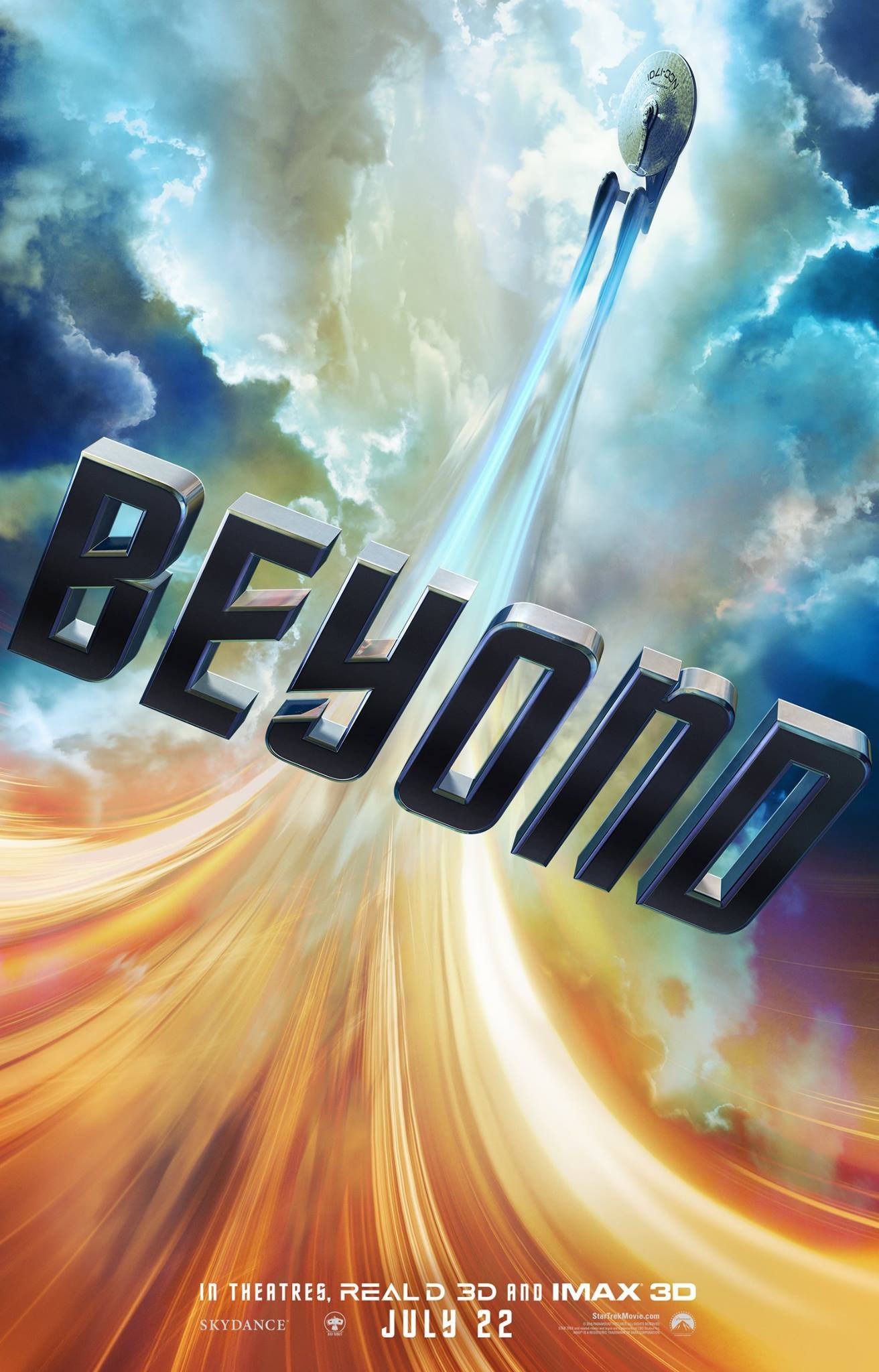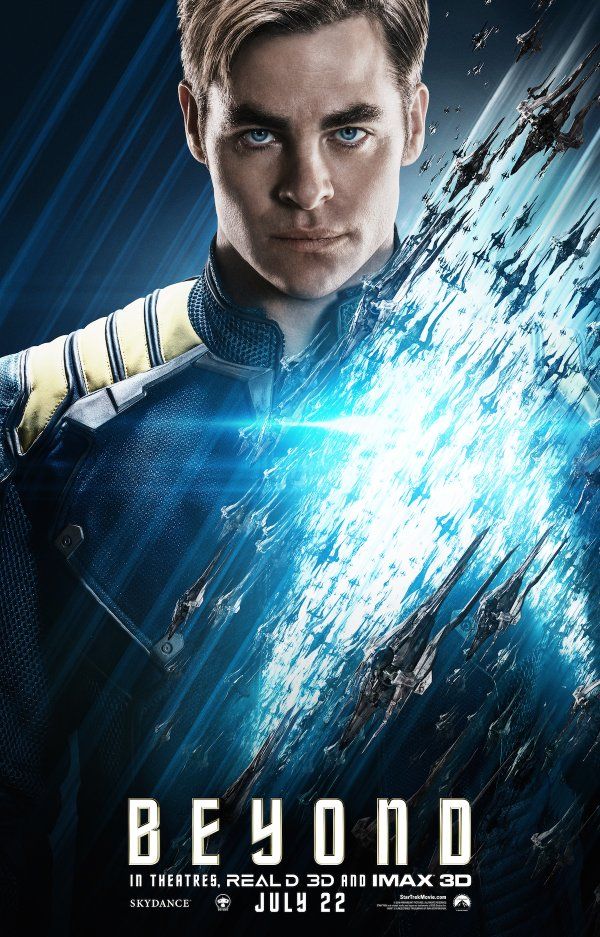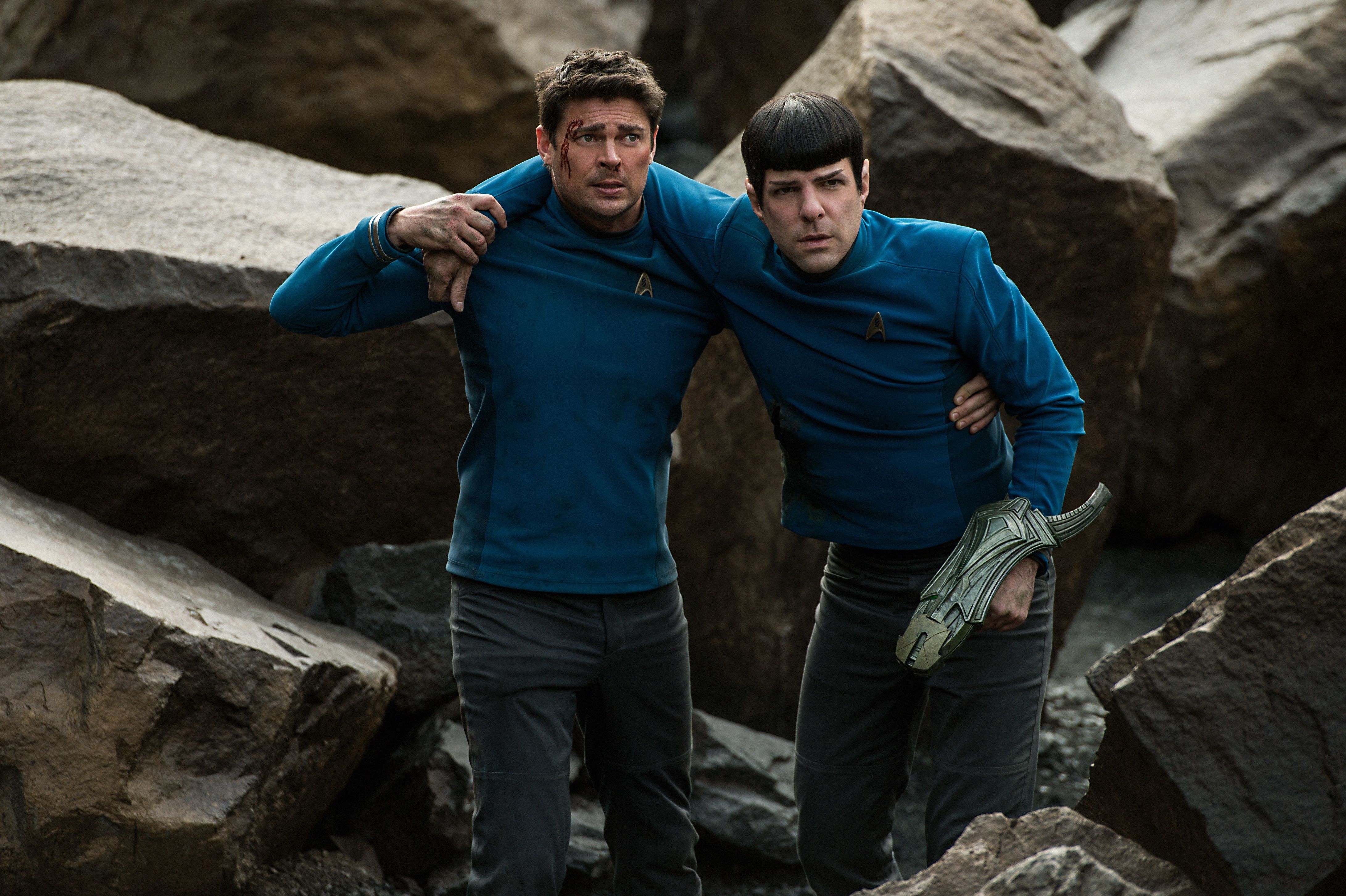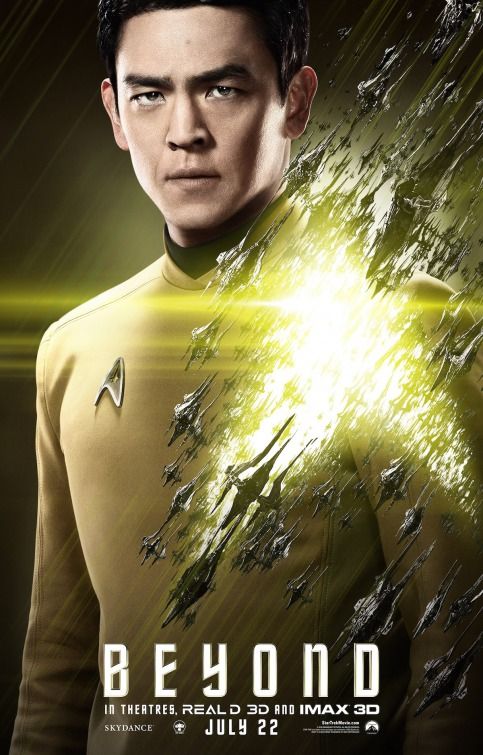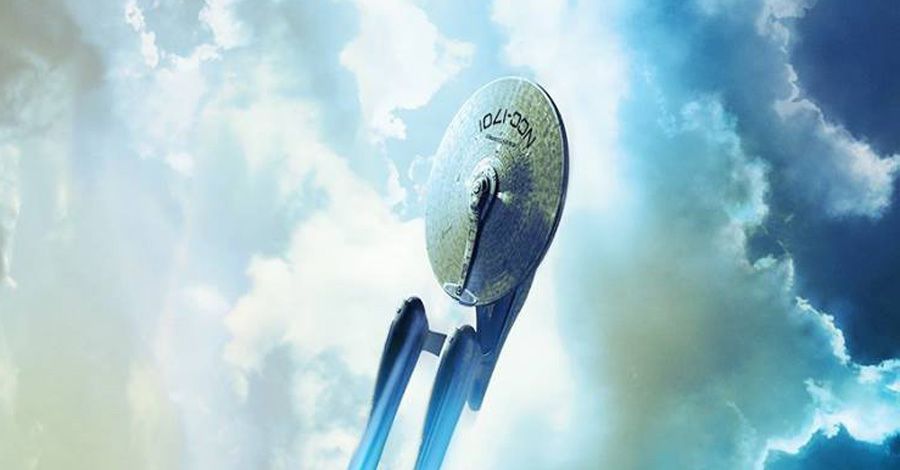It's hard to imagine, but the cast of the rebooted "Star Trek" franchise has now been the custodians of the characters for seven years. That's more than twice as long as the original series was on the air, though they have logged fewer actual hours on the Bridge of the Enterprise.
How Boldly Will "Star Trek Beyond" Go Where Other "Treks" Have Gone Before?
With "Star Trek Beyond," the third entry in the revitalized film series, it's clear that the actors of second-iteration Enterprise crew -- Chris Pine, Zachary Quinto, Karl Urban, Zoe Saldana, John Cho and Simon Pegg (who also took on screenwriting duties this time around) -- are comfortable with their roles. They're also all eager for opportunities to grow them, both in evocatively familiar and refreshingly new directions, as they revealed during a lively press conference.
On revisiting and tweaking some familiar and long-beloved "Trek" elements in the new mission:
Chris Pine: I always have the most fun on these films, either when we're laughing or talking, and then -- usually then shit blows up and we have to do the shit-blowing-up acting, which I think I spend the majority of the film saying, "Let's go! Can we do it? I don't know!" Just breathing heavily.
I talked a lot with Simon [Pegg] about how to nuance what, particularly, was Kirk's trip in this whole thing. Once we landed on the idea of him growing out of, or moving out from underneath his father's shadow, that made a lot of sense. To do [that scene] with Karl [Urban] was great fun, and we had all that fun stuff with the whiskey and the vodka moment. Just little itty bitty things that make us giggle and have a good time, and that hopefully people appreciate.
Karl Urban: For me, I feel like this is probably the most fun that I've had making a "Star Trek" film. I think what [screenwriters] Simon and Doug [Jung] were able to do was present the most well-defined, well-rounded version of the character. It certainly gave me a lot of material to work with.
I had an amazing time working with Zach [Quinto], and I have a huge amount of respect for him and his approach. It was just great to have those two characters that are so diametrically opposed to each other be forced into a situation where they have to depend on each other to survive, and through the process, come to a deeper understanding of who they both are. It was obviously a great opportunity to explore a lot of comedy, but it also really kind of deepened the relationship between the two.
Zachary Quinto: Karl and I had a great time working together. In a movie franchise where we're used to spending so much time together -- all of us, really -- on the bridge of the Enterprise and in many of our adventures, it was actually really nice to have so many days where it was only Karl and me together. I think we got to know each other and appreciate each other more than we already did, which was already a significant amount.
And I think from a character standpoint, I really echo the idea that these two characters, historically in this franchise, come at things from entirely different perspectives and points of view. I think there's nothing more fun for fans of the original show to see that dynamic, unmitigated by Kirk, who usually manages to get between them.
Pine: This was like the retro-super-future version of "Star Trek," so it's looking way ahead into what "Star Trek" can become, and also having very specific nods to the past.
And one of the very small things that's layered throughout all three iterations of the film so far -- there's been a lot of discussions about the colors of yellow, for instance, for Kirk's shirt, and the cut of the shirt. And this one is a very specific nod to the original series. It's not the kind of bright, fantastic yellow of the first and the second [films]. It's this kind of lovely, Kirk-ian mustard green.
On the evolving state -- sometimes dramatically and controversially -- of long familiar Enterprise crewmembers:
Zoe Saldana: The one thing I appreciated the most about what Simon and Doug did for this installment was that they made us human, and just homesick and sad. And how being overly worked and being away from home and all the things that keep you grounded can put a strain, not just on the intimate relationships that you may have, but also the professional ones.
I thought I would never see the day where I would walk into the Enterprise, and we're kind of like -- not rolling our eyes at each other, but we're not that excited to see each other. I thought, "Okay, this is a great place to start, because I can only imagine where we're going to end up." And we literally end up in the opposite direction. We're dying to be close to each other. We're dying to save each other to get back together. So I thought, okay, that's brilliant.
The relationship with Spock and Uhura felt so normal and human to me, that it's sort of the consequences that may occur when you decide to love your coworker in a lovey-dovey way. Sometimes the professionalism can get in the way of the spirituality, and I feel like that's what happened between both of them. I have a feeling it was probably like her decision to sort of go, "Listen, you have a lot of stuff that's about to start brewing from your end, and I have to figure some stuff out--"
Quinto: That was your decision?
Saldana: Be a gentleman!
Quinto: Think what you need to.
Saldana: I think there's a beautiful -- I hate using the word "sprouting," but it's true. Women are becoming very, very independent. Not just in the workforce, but also in their personal lives. There's something about realizing that you should want to be a part of something, you don't necessarily have to be a part of something in order to be validated or respected or appreciated or considered strong enough.
So I feel that this breakup that Uhura and Spock have is amazing, because she fell in love with her teacher. So he came as this figure that represented responsibility and safety and maturity and wisdom, and now I think that she feels strong enough to [move on].
If I choose to see it that way, there is a parallel universe situation that's going on with Uhura and women these days, is that, there's no longer this animosity or this resentment to sort of prove who you are, you just want to be alone. You just want to be left alone to sort of find out who you are, because you're interesting and you're curious.
I like this autonomy that's happening with women right now. I like when a battle is fought just with a spoken word, and nothing that feels tense or violent behaviors.
John Cho: One of the questions that we were asked, maybe for giggles, on the tour in either Sydney or London, was, which timeline would you choose to be in, the original series or ours, if you had the choice?
And I did say ours, if forced to choose, for this reason: ["Star Trek" creator Gene] Roddenberry did set up a world that was incredibly progressive, but it was tempered by the social mores of the era. I feel like we can go further in 2016 than he was able to do at the time. To your point, I feel like that our version is able to give more to the women and the people of color in the cast than Roddenberry was originally able to, I think.
Simon Pegg: Not because he didn't want to, either.
Cho: Not because he didn't want to, correct.
Pegg: He absolutely wanted to.
Cho: The idea [that Sulu was gay] came up, I believe Simon pitched it. Then I was told of it through Justin [Lin] pretty early on, when he had set up at Paramount. We went in to have a chat and get reacquainted. I thought it was a beautiful idea. I had concerns about how it would be received by George [Takei], and I had some other concerns. But it was really the handling of it that was the most important to me.
Having seen the film, I think its nonchalant posture toward it is the best thing about it, and the fact that it's normalized. It's kind of news now, but if you re-watch the movie in ten years, you won't think anything of it. It'll just go right by you. That's the best thing about it. There's no music cue. There's no close up. It's just…
Pegg: "Dun dun dun!"
Pine: "He's gay! He's gay, everybody!"
Pegg: "He's with a man!"
Saldana: The one thing that I guess has taken a secondary position is that, it wasn't just that we revealed that he's gay: it revealed that he's a father. None of our characters have families that we've ever talked about. So I actually feel quite puzzled that in 2016 we're having like a bit of a fit over who he fathered a baby with. I'm happy he's a dad.
Pegg: The point is, is, he had somebody on Yorktown -- what we wanted to do was put somebody we care about in Yorktown, so when Yorktown was under threat, that made the threat tangible. We knew that Sulu's family was there. So it wasn't just a bunch of faceless Federation people. It was somebody that we cared about, too, because we care about Sulu. That was really important. The nature of that relationship wasn't an issue.
By the way, that whole thing with George, people like to make things into a spat. George and I email all the time, with big, long, lovely discussions about it, and on great terms. We were never shouting at each other or anything like that. And it's a great discussion to have, so I'm really happy with the way that it's been talked about and responded to, and I'm still a huge fan of GT, for sure.
On director Justin Lin taking the helm from J.J. Abrams:
Quinto: Justin has a different energy about him. I'd say he's a little more internalized, just as a person. He's a little quieter, but he's no less confident. He's incredibly gifted as a visual storyteller. I think he's really sensitive to character dynamics as well. He brings a balance of both of those extremes.
He came in on already moving train, in a lot of ways. He didn't have a lot of time to prep for this film. I think all of us were incredibly impressed by his sense of leadership and vision, and I think also it was really great to have Simon in a position of creative influence on this film, because he was a tremendous conduit for us early on before we formed our own relationships with Justin.
But all in all, he was a really welcome addition. I would say very different from J.J., but also really exciting and really unique in his own ways. And reflective of this experience, which was different and new for us, to be away from the past and the configuration of the last two films. But we all had a great time working together, and we really enjoyed him, and seeing what he was able to create in the final product is really exciting for all of us
On the enduring appeal of "Star Trek" franchise:
Pegg: I think the film is actually even more apt today, it's become more so, even since we shot it. The message of this, the social commentary in this iteration of "Star Trek" is that we're better together. That's what it's about. It's about collectivism. And in this era of Brexit, and talking about building walls in certain places, now more than ever we should be thinking about the value of collectivism, about cooperation, about unity.
That can be and is our strength, and the more fractured we become, the less secure we all feel. The villain in "Star Trek" -- we could've called him "Brexit." It's kind of a science fiction name.
Cho: In the "Star Trek" setup, you're going into space and seeing so many different kinds of species, it does become comically apparent when you look around the planet Earth that we live on that we do have so much more in common than we don't. So the little things that seem to divide us here in our present time seem even more exaggeratedly small after seeing an episode of "Star Trek."
Quinto: I think the message is the same as it was when it began. It's just that we have more room to explore and express it than they did at the time. It's shocking to me how divisive our culture has become, and I feel like "Star Trek" maintains a position on inclusivity and unity that is as resonant today as it was in the late '60s.
This film in particular explores that idea, one side of that being about the unity and inclusivity and the other being about breaking that apart. And I think that's really reflective of the society we live in today. It's troubling to me on such deep levels that we've gotten to this point of unwillingness to see varied points of view or feelings or opinions or perspectives.
I think "Star Trek" remains, in a landscape of popular culture entertainment, something that is a beacon of inclusivity and progressive thinking. I think it just takes on different forms now than it did 50 years ago.
Pegg: I hope it goes on for another 50 years. We'll keep going for as long as we can, until we're old and inappropriate. Some of us already are, I'd say -- me. And who knows? The thing is about the new timeline is Picard, Janeway, all those guys -- they don't exist. I'm kidding! I'm kidding! Man, would I be in trouble!
Yeah, I hope it goes on. There's a new CBS series starting. They've got the galaxy -- I love that the universe is a boundless place and there's so many adventures to be had.
And as long as we have this idea that we might not just all kill ourselves and die in a big fire, we might actually become slightly more enlightened, slightly more tolerant beings and go off into space -- that is a lovely idea that I think secretly the vast majority of us want to achieve, you know? "Star Trek" will live forever.
"Star Trek Beyond" warps into theaters July 22.

